ICU Farm Project
The ICU farm project was launched in the spring of 2024 as a collaboration between JICUF and ICU. The project seeks to revive the campus farm established when ICU was founded. It aims to utilize ICU’s rich natural environment as a learning space centered on food and agriculture, and also fits well into ICU’s mid-term plan (2021-2025), which emphasizes the “social implementation of the liberal arts.”
The idea for the farm project first emerged in 2018, before the COVID-19 pandemic. JICUF President Paul Hastings and Vice President Aki Takada led a meeting at ICU to explore the concept. ICU professors, representatives from Mitaka City Hall, dedicated students, alumni involved in organic agriculture, and members of Japan Agriculture participated in discussions about potential projects for the ICU campus. However, before the proposal could advance, the COVID-19 pandemic brought the initiative to a standstill for several years.
In the fall of 2023, Paul met with an ICU alumna already involved in other JICUF and ICU projects. When he shared his vision for the farm project and his passion for sustainability, she expressed her strong support and pledged to help, ultimately enabling the project to move forward.
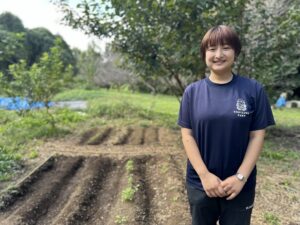
In April 2024 ICU hired Chigusa Horiuchi as the first Farm Manager. Chigusa graduated from ICU with a major in Environmental Studies in March 2024 and while she was a student was deeply involved in agriculture projects on campus. We spoke with Chigusa to learn more about the details of the project and her aspirations for its future.
JICUF: Could you tell us about your studies at ICU and how you became the Farm Manager?
Chigusa: At ICU, I focused on environmental studies and often thought about solutions to global environmental issues. This inspired my interest in food and agriculture at ICU. Outside of class, I helped with farm work at local farms and supported agricultural activities for children. During a two-month farm stay in Tasmania, Australia, during a leave of absence in my fourth year, I reaffirmed my passion for working with food and agriculture.
As graduation approached, I learned about the opportunity to become the ICU Farm Manager. The chance to work at my alma mater and integrate food and agriculture into education felt like the perfect fit, so I applied without hesitation.
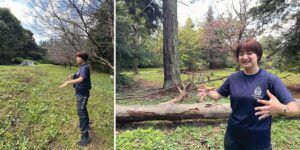
JICUF: What is your vision for the farm project at ICU?
Chigusa: While food and agriculture activities such as wasabi cultivation and beekeeping already exist on campus, only a small number of students are involved, and the campus’s natural environment remains underutilized in education. The farm project aims to expand these activities by focusing on “food” and “agriculture” and creating opportunities for more students to connect with the soil and develop an appreciation for food and nature. We plan to collectively refer to areas like the wasabi fields and orchards as “ICU Farm” (tentative) and revitalize these spaces to integrate them across campus.
Moving forward, we want to focus on three key aspects: creating a space for “experiential learning” where students can physically engage with food and nature; fostering “collaboration” where people from diverse backgrounds work together in an enjoyable setting; and utilizing natural resources like bamboo and wood to contribute to the conservation of the campus forest.
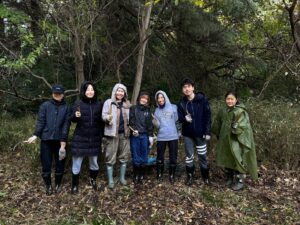 Working with students in the light rain (Photo by Kyoka Horiuchi)
Working with students in the light rain (Photo by Kyoka Horiuchi)
JICUF: What specific activities are part of the farm project?
Chigusa: We are working with students to prepare various areas, including the existing wasabi fields, spaces where student groups have been active, and the orchard where planting began this winter. We aim to maintain a system that encourages participation while also developing mechanisms, like an internship program, to enable proactive students to take on larger roles.
Once we achieve a sufficient harvest, I hope to use the produce grown at ICU in creative ways, such as supplying the campus cafeteria or hosting events. My goal is to build this project collaboratively, drawing on the knowledge, ideas, and cooperation of students, faculty, and the local community.
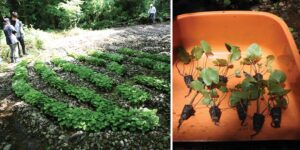 Working in a wasabi field with local volunteers (Photo by Koto Miura)
Working in a wasabi field with local volunteers (Photo by Koto Miura)
JICUF: The preparation work for the farm—like weeding and leveling the ground—seems immense. What are your long-term goals for the project?
Chigusa: This past October I had the chance to visit “The Knoll,” a farm at Middlebury College in Vermont. What stood out to me was that it wasn’t just a farm—it was a space where people could gather, relax, and interact freely. For ICU’s farm project, I want to create similar spaces that combine food and nature in creative ways beyond traditional farming. For example, I’d like to install benches and tables where people can rest or plant herbs and vegetables in unused flower beds to create spaces where people can experience food and nature daily.
Ultimately, I hope that when people think of ICU, they’ll immediately associate it with “Farm!” or “nature!”—symbols of a deeper connection to the environment and sustainability.
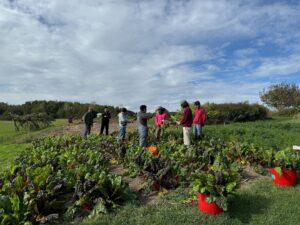 Visited the “Knoll” at Middlebury College in Vermont
Visited the “Knoll” at Middlebury College in Vermont
Chigusa, who loves nature deeply, spoke passionately about the farm project.
We look forward to seeing her future success.



